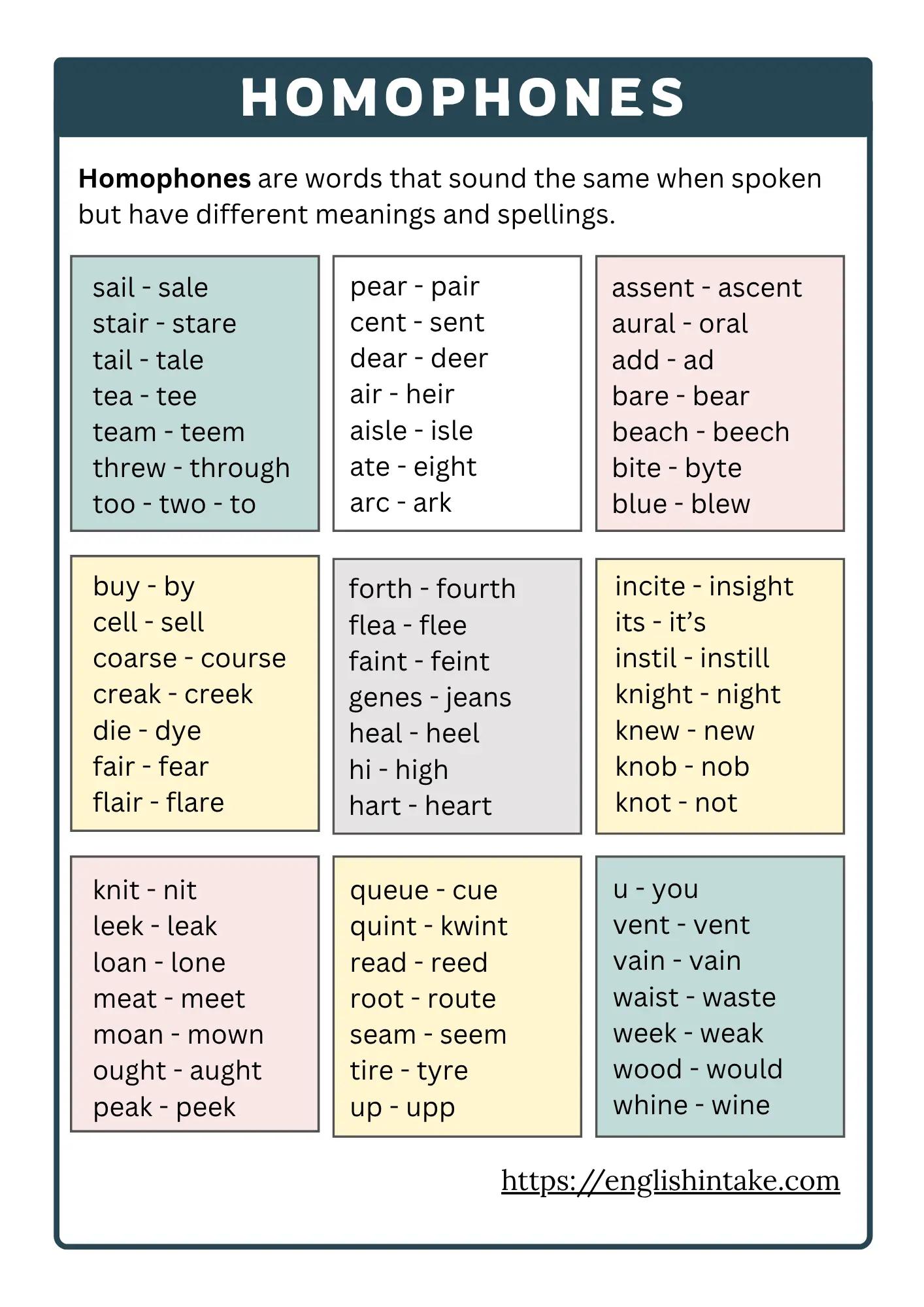1. What are homophones?
Homophones are words that sound the same but have different meanings and may have different spellings. They can sometimes confuse learners. In this lesson, we will learn common homophones, their meanings, and how to use them correctly in sentences.
2. Examples of common homophones in English
there / their / they’re:there: refers to a place. "The book is over there."
their: shows possession. "Their house is beautiful."
they’re: a contraction of "they are." "They’re going to the park."
to / too / two:to: a preposition or part of an infinitive verb. "I went to the store."
too: means "also" or "excessively." "I want to go too."
two: the number 2. "I have two apples."
pair / pear:pair: refers to two things. "I bought a pair of shoes."
pear: a type of fruit. "She ate a juicy pear."
flour / flower:flour: a powder used in baking. "We need flour to make bread."
flower: a plant’s bloom. "The garden is full of beautiful flowers."
sea / see:sea: a large body of water. "The sea is calm today."
see: to perceive with the eyes. "I can see the mountains."
- air, heir
- aisle, isle
- allowed, aloud
- altar, alter
- ate, eight
- bare, bear
- beach, beech
- bean, been
- beat, beet
- berry, bury
- blew, blue
- brake, break
- buy, by, bye
- cell, sell
- cent, scent, sent
- cereal, serial
- chews, choose
- coarse, course
- complement, compliment
- creak, creek
- dear, deer
- desert, dessert
- dew, due
- die, dye
- discreet, discrete
- doe, dough
- done, dun
- earn, urn
- eye, I
- fair, fare
- feat, feet
- find, fined
- fir, fur
- flour, flower
- for, four, fore
- gait, gate
- gene, jean
- gorilla, guerrilla
- grate, great
- groan, grown
- hair, hare
- hall, haul
- heal, heel
- hear, here
- heard, herd
- hole, whole
- hour, our
- idle, idol
- in, inn
- its, it's
- knead, need
- knew, new
- knight, night
- knot, not
- know, no
- lain, lane
- leak, leek
- lessen, lesson
- loan, lone
- made, maid
- mail, male
- main, mane
- meat, meet
- medal, meddle
- missed, mist
- morning, mourning
- none, nun
- oar, or, ore
- one, won
- pail, pale
- pair, pear, pare
- passed, past
- peace, piece
- plain, plane
- pore, pour
- pray, prey
- queue, cue
- rain, reign, rein
- raise, rays, raze
- read, reed
- right, write, rite
- road, rode
- role, roll
- root, route
- sail, sale
- scene, seen
- sea, see
- seam, seem
- sew, so, sow
- sight, site, cite
- sole, soul
- some, sum
- son, sun
- stair, stare
- stake, steak
- stationary, stationery
- steal, steel
- suite, sweet
- tail, tale
- their, there, they're
- threw, through
- to, too, two
- toe, tow
- waist, waste
- wait, weight
- war, wore
- warn, worn
- way, weigh
- weak, week
- weather, whether
- which, witch
- wood, would
- your, you're
3. Incorrect use
Misusing homophones can lead to confusion or misunderstandings, especially in written communication. For example:
Incorrect: "Their going to the park."
Correct: "They’re going to the park."
4. Quiz
In this interactive quiz, you’ll answer 45 questions in total, divided into sets of 5 questions at a time. After completing all 45 questions, you’ll see your final score and detailed feedback on which answers were correct or incorrect. Good luck!
Test your knowledge of English homophones
Quick overview of the quiz!
- There are 45 questions
- You’ll choose the correct homophone for each sentence
- Track your score and time as you progress
- Get full feedback at the end
Time: 00:00
I want to go ___ the store.
She bought a new ___ of shoes.
___ going to the park later.
Can you ___ the ocean from here?
She used ___ to bake the cake.
The ___ is so calm today.
He ate a juicy ___ for a snack.
___ house is painted blue.
I have ___ apples in my bag.
The ___ in the garden is blooming.
Is this ___ book?
Do you know ___ the keys are?
The ___ rode his horse into the sunset.
I need to ___ some groceries.
Turn ___ at the next corner.
It’s ___ hot outside today.
My ___ is playing in the yard.
I can’t ___ for the results any longer.
The farmer will ___ the seeds in the field.
Did you receive the ___ I sent you?
The landscape was flat and ___.
She tied the ribbon around her ___.
The ___ poured down all day.
Let’s ___ for coffee tomorrow.
Please ___ your name on the form.
The ___ in the fence needs to be fixed.
She signed up for a new ___ at the University.
The bridge is made of ___.
Don’t ___ at people like that.
A ___ ran across the field.
I ___ a strange noise last night.
He ___ the ball across the field.
My ___ is coming to visit us.
___ of the students passed the test.
He used an ___ to row the boat.
She carried water in a ___.
Can you ___ this book to me?
He played the ___ of a hero in the movie.
The ___ of the dress was beautifully stitched.
He walked on the ___ of his feet.
Would you like a cup of ___?
She told an interesting ___ at the party.
Do you have ___ to help me?
Don’t ___ food; it’s precious.
The ___ is perfect for a picnic today.
5. learning material

